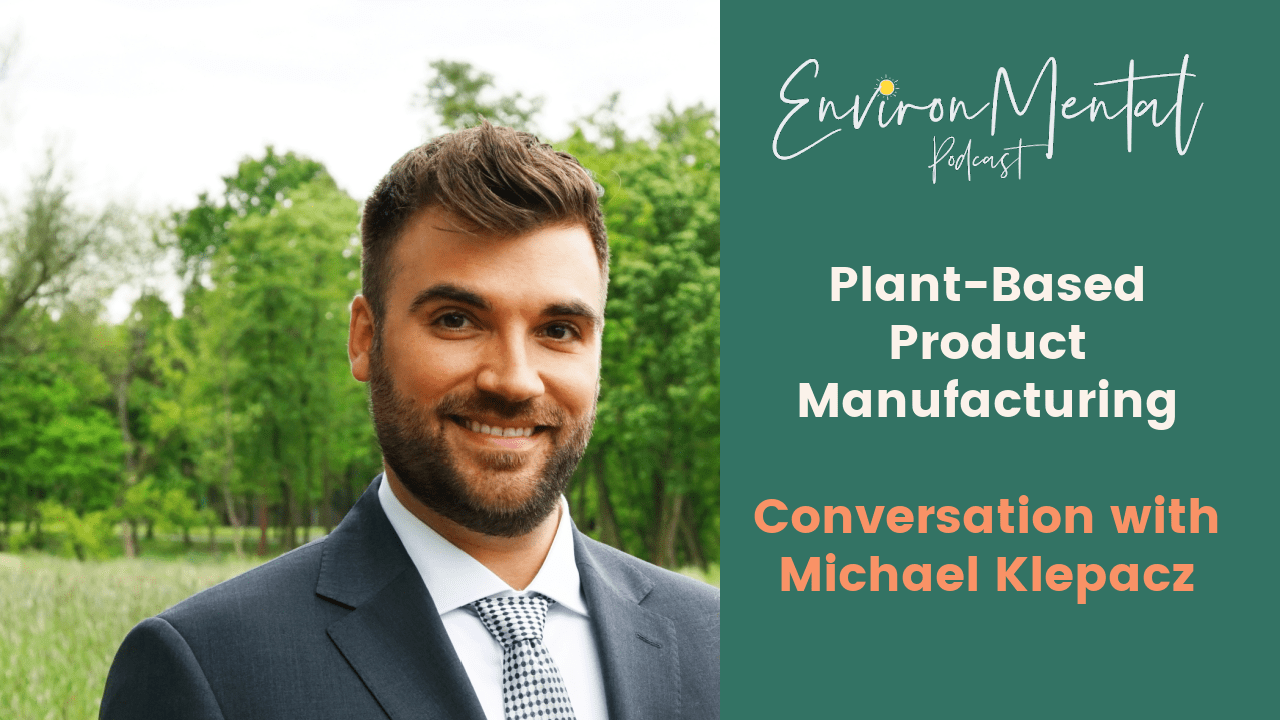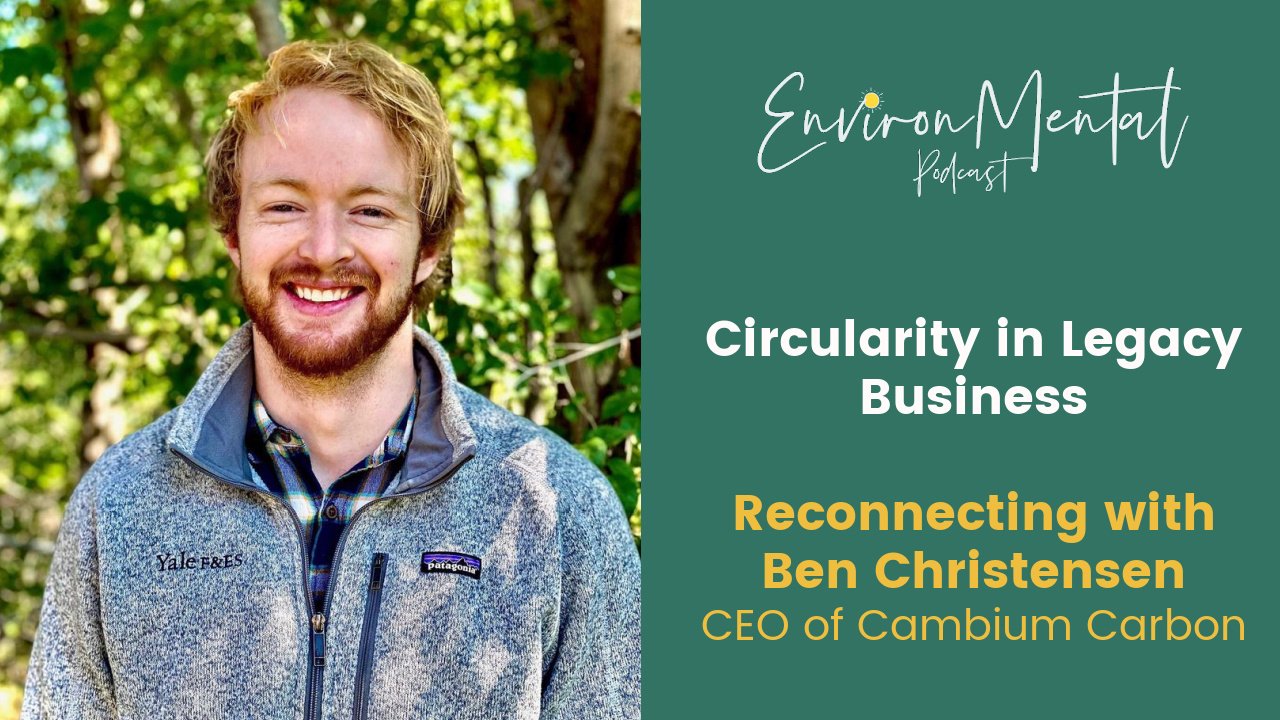“I looked at the principles of Burning Man and the principles of Permaculture and asked, ‘what does the company that follows these principles look like?’ And that’s my company.” Michael Klepacz on creating Natural Materials Unlimited, a company for eco-manufacturing plant based products. Think a baby wrap made from hemp fabric, a business card from treeless paper, or any size webbing you can imagine made from linen!
In this episode of EnvironMental with Dandelion, aub spoke with Michael Klepacz about how the usefulness of bast fibers was squashed by the paper mafia, the dogma around wood pulp, and the cotton gin.
What are Bast Fibers?
Before we jump into the drama, we’ve got to start with the definition of bast fibers. A bast fiber is a fiber collected from inside of a plant’s stem. Plants like hemp, linen (or flax), and nettle are examples of bast plants that have been used to create fibers and fabrics for thousands of years.
In fact, Michael told us that a linen or hemp fabric shirt used to be the cheapest item of clothing on the market! And that paper was made from worn out and repurposed shirts. How amazing and sustainable! But (of course) all that changed in the early part of the industrial age.
How Hemp Fabric Became Less Commercial: The Cotton Gin
Historically, removing the seeds from the cotton plant was a difficult process. The process being difficult made cotton fabric scarce, and thus expensive. Cotton farmers in the 1700s were struggling to make a living (eye roll) because removing seeds from the cotton plant was slow, arduous work. Read: despite offering what, at the time, was a luxury fiber, the profit from the free labor that cotton farmers stole to run their massive plantations just wasn’t high enough.
To solve the problem, Eli Whitney patented the cotton gin in 1794. The cotton gin made removing the seeds from cotton fibers simple. Within 50 years, cotton was the USA’s number one export. There was a crazy-high demand for cotton, allowing the USA to expand its cotton plantations – thusly to expand their slavery expeditions in an exponential cycle that lasted more than 100 years.
The cotton gin worked so well that cotton fabric flooded the market and flipped the textile industry on its head. While hemp farmers around the world were still processing their crops by hand, the cotton industry was taking off. Suddenly linen and hemp fabric were slower and more difficult to make and cotton was everywhere.
Then Hemp was Outlawed
Oh, but it doesn’t stop there. After more than 100 years of unprecedented growth in the cotton industry, George W. Schlichten patented a machine that separates bast fibers. And then the hemp plant was promptly outlawed.
Now, there is a ton of conspiracy around this – and we’ll never have clear answers because the backend deals of politics have always happened behind closed doors. But lets take a look at it like this: slavery had been abolished 50 years prior. The cotton industry, although very large was now having to pay for workers. Coupled with World War 1, which saw falling cotton prices, the profits from cotton were in trouble. Do you think the head of a cotton plantation would jump for joy when he found out that hemp had an industrial processing machine? We don’t think so.
And do not get aub started on the conspiracies happening around the same folks, the pharmaceutical industry, and herbalism at the same time.
The Dogma of Wood Pulp
Alright, so there’s a bit of exhausting truth about hemp fabric competitors – but what about hemp (or other treeless) paper competitors? Unfortunately, it’s a similar story. Michael told us that the real word that comes to mind in the paper industry is “dogma”. He explained a complicated connection between the paper mills, the forestry industry, and the politicians and we’re here to tell you – damn. There’s basically a paper mafia.
Not only is there an obsession with pure white when it comes to paper – which is a(nother) chemical process – it’s always about the wood. Michael told us about the obsession for perfect quality paper – which by societal standards comes from wood processing. But sometimes, we would even venture to say most of the time, folks just need something to write on. But the mills will hardly entertain the idea.
Why? Because capitalism OF COURSE! You can’t process bast fibers exactly the same as wood in the mills. One would need to invest in more machinery for the mill OR clean and change the mill to run with different pulp to make the paper, both of which are a huge expense. Additionally, a single large paper mill needs something like 80,000 hectares of pulp per year to make pure hemp paper. That’s more than the whole world of planted hemp right now… oh yeah.. cause it was illegal.
And remember – the dogma. Blends seemingly aren’t the rage. So. Here we are again. Annoyed. Using our forests to wipe our asses and take notes no one will ever see.
Why Choose Natural Materials Unlimited
Michael wants to change that. Even if it’s just a little corner of Poland – someone has to start rocking the boat. This guy? He’s the guy. The conscious capitalism-minded burner with the plan to build a business from a place of morality. Natural Materials Unlimited (NMU) is a company dedicated to using bast fibers – linen and hemp in particular – to create eco-friendly products in Poland.
Not only is he dedicated to using natural materials to create things like wick from hemp fabric, dog collars from webbing, or artfully-crafted hemp guitar straps, Michael literally knows his whole factory staff. He can tell you the life story of the guy that does leather working on his guitar straps. He has nicknames for his webbing creator. He knows the guys at the small paper mills that do process hemp by first name.
NMU can make just about anything a business focused on SDGs could want to sell! If you can think of it – Michael will engineer it and make it happen. You can email him here: michael@naturalmaterials.pl




